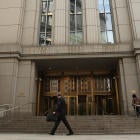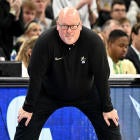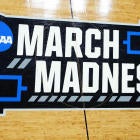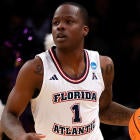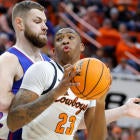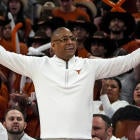NEW YORK -- The decision on whether co-defendants Christian Dawkins and Merl Code should take the stand in this still-revealing trial on corruption and bribery in college basketball appears to fall on the shoulders of federal judge Edgardo Ramos.
Crucial, anticipated wiretapped phone calls that are yet to be entered into evidence will be hashed out Tuesday evening by prosecutors and defense attorneys; Ramos will have final say on what gets played for the jury. Some calls are expected to be agreed upon for inclusion in Wednesday's proceedings. Inevitably, others will not be. The sides have been tussling over this for weeks.
The defense wants all selected calls entered into evidence so the jury can hear them. The defense believes the calls greatly help its case. We know this because, with increasing possibility, if the calls are not allowed to be played in federal court, Code and/or Dawkins may have little choice but to take the stand in order to have a stronger chance at winning a not-guilty verdict.
What a moment that would be to punctuate this trial, which has been a bad look for college basketball and, by extension, the NCAA and its behindhand rules of amateurism. In particular, Dawkins taking the stand could be a revealing and weighty moment for this trial and college hoops.
If Ramos decides to side with the government (as he has done frequently in this trial) and its arguments over these pieces of evidence, then Dawkins and Code will have big decisions to make.
Those decisions are expected Wednesday morning.
Ramos has been objective, open-minded and likable throughout. He comes off as the kind of judge any attorney would want overseeing their case.
According to Dawkins' attorney, Steve Haney, one of the calls in question features Dawkins telling undercover FBI agent Jeff D'Angelo (an alias), "I ain't gonna pay no coaches." He also supposedly says he's going to take D'Angelo's money, the cash he was giving to fund coaches, for himself because Dawkins just doesn't like or fully trust D'Angelo.
The discussion about this call came after the jury left the courtroom on Tuesday. Earlier in the day, Code attorney Mark Moore sought for another call to be played for cooperative witness Munish Sood during his testimony, one in which Code apparently says he doesn't want anyone paying the coaches he knows personally. Ramos shot it down (citing relevance and admissibility but acknowledging its importance), explaining that if what Code was saying and implying on that call was what Moore was proclaiming, it's within Code's rights to take the stand and defend himself.
Moore later tried to work around this on his cross examination of Sood, but he couldn't crack through, as objection after objection from the prosecution was sustained by Ramos.
"Mr. Code never sent a single college basketball coach to you and your conspirators to take any money, isn't that a fact, sir?" Moore asked Sood, to which Sood replied, "Never to me."
While Haney's cross examination tactics of Sood were lashing at times, Moore took the scenic route and spent a bit too much time on peripheral tangents regarding Sood flipping in the case and his jagged business background, which included a couple of heavy financial lawsuits not previously brought up in the trial. Both attorneys painted Sood, 46, as an intelligent rat who's nonetheless been dishonest. (He admitted to lying to authorities upon his arrest; Sood pleaded guilty in this case in August 2018, almost a year after being charged). The men linked Sood with the other cooperating witness in this case, Marty Blazer, whose admitted federal crimes make Sood look small-time in comparison.
But Sood did nonetheless team up with Blazer years after severing his business relationship with him after he discovered Blazer was a fraud who stole or illegally tampered with millions of dollars from his clients.
"It was the biggest mistake of my life, giving him a second chance," Sood said Tuesday.
Haney's argument to the jury was that Dawkins was often doing the bidding for ASM Sports and its chief officer, Andy Miller, who lost his license to be a sports agent after this case broke in September of 2017.
Sood testified to knowingly breaking the rules and providing $2,000 per month to the handler of then-Utah player Kyle Kuzma, who went on to be a first-round pick and is now a starter for the Los Angeles Lakers. This came through facilitation of NBA agent Steve Pina, who Sood said he was linked up with by Dawkins. (Pina worked for ASM Sports.)
"You wanted to break the rules to establish a relationship with the Kuzma camp," Haney pressed Sood. "You got rewarded for that cheating, didn't you?"
Haney also pointed out that Dawkins never paid former South Carolina/Oklahoma State coach Lamont Evans after he was fired from ASM Sports. Evans was shown to be a hustler who took money from multiple separate parties, including NBA agent Seth Cohen, as he shopped out his connections with his college players and recruits.
"Wouldn't you agree that this is a perfect example of how paying a college basketball coach is a complete waste of money?" Haney asked Sood.
And of course there's the scene on the yacht in New York's Battery Park on June 20, 2017, when Sood, Blazer, Dawkins, Sood's assistant and the two undercover agents met to sign paperwork and exchange money to earnestly start LOYD Inc., Dawkins' business project. Haney pounced on the inorganic dynamic of the circumstances of that meeting. D'Angelo and fellow undercover agent Jill Bailey (also using a fake name) provided Sood and Dawkins -- two men who didn't know each other exceedingly well, who were more than 20 years apart in age but nevertheless linking up in a business venture -- with expensive scotch.
"And you didn't see about 100 things wrong on that yacht, Mr. Sood?" Haney asked.
Haney tried to chip away at the FBI's investigation, showing that it was D'Angelo who was deciding where meetings would take place, handing out the money and -- as Sood agreed on the stand -- deciding when money would be distributed to coaches and not doing so "unless Jeff D'Angelo said so."
Sood reminded the jury (via his testimony) that in fact Dawkins was not in the room either time Book Richardson took thousands of dollars in bribes while working for Arizona.
Haney's case was even amusingly backed up by a wiretapped call from June 2017 when Dawkins and Sood are discussing D'Angelo and his apparent aloofness to the whole operation. D'Angelo, out of his element, expressed interest in meeting college players as a perk of funding the enterprise.
"I need you to be the money guy, that's it," Dawkins tells Sood, referring to D'Angelo. "That's it. Honestly, it's like, I'm starting to think, like, maybe I'll just get somebody else to f---ing give him his money back because he doesn't understand it. … I'm trying to figure out why the f--- does he care so much. I almost wanna figure out, like, is this mother----er trying to do some crazy shit."
Dawkins was bewildered over why D'Angelo was showing himself to be eager to meet college players. Something was just weird about the guy. Dawkins knew it. Sood did, too. Neither really both knew until they were arrested in late September 2017, though.
When needled by Haney about his character and why he flipped for the government, Sood coldly responded, "I cooperated. Everyone's got an option."
The government has a lot piled on top of Dawkins, and less so with Code. The video that's been played in court, the wiretaps that repeatedly confirm Dawkins was wanting to pay to land players, it's easy evidence to sway a jury. The defense has a tough task in the coming days.
Tuesday was bookended by audio and video evidenced tied to former USC assistant coach Tony Bland, who pleaded guilty earlier this year. Covert video has Bland in a meeting at The Lab Gastropub, near the Trojans' home basketball arena, on Aug. 31, 2017, discussing the scheme to steer players to Dawkins' company, LOYD Inc. Bland took the meeting with Dawkins, Sood and Bailey.
"Do that," Bland said. "Do that stuff. Yeah, yeah."
Sood testified to the video, saying the meeting was to discuss USC players and recruits, specifically Taeshon Cherry (who wound up choosing to play for Arizona State) and former Trojan De'Anthony Melton. Sood said under oath that Dawkins set up a meeting with him, Bailey and Melton's uncle after that lunch on Aug. 31, 2017, and that Bland was aware of that meeting. Relatedly, in a wiretapped call from August 15, 2017, Dawkins tells then-NBA agent Andy Miller that Melton's uncle wants "a lot of f---ing mon[ey]."
Will there be more tapes with more dirt? Wednesday might provide one more opportunity. Tuesday was at times effective, other times laborious for the defense. Now those defense lawyers get to call their witnesses. Will Dawkins and/or Code be among them? If it's Dawkins, the tenor of this trial could easily alter, its ripple effects once more making waves outside the courtroom and far across college basketball.












